Cross-Cultural Conflicts: Business Management Report, University
VerifiedAdded on 2022/08/22
|8
|1786
|12
Report
AI Summary
This report examines cross-cultural conflicts arising from differences in values, beliefs, and practices between individuals and groups. It utilizes Hofstede's Cultural Dimensions to analyze the cultural differences between the USA and Tanzania, focusing on ethical dilemmas, particularly the issue of bribery within a business context. The report explores a case study involving Hydro Generation and its project manager in Tanzania, assessing the ethical implications of his actions and the resulting conflicts. It also discusses alternative approaches to mitigate these conflicts and improve project outcomes. Furthermore, the report includes a reflection on a group project experience, highlighting challenges, strategies for improvement, and lessons learned in teamwork and time management. The analysis covers the application of CSR theory, ethical relativism, and the importance of cultural awareness in international business operations.
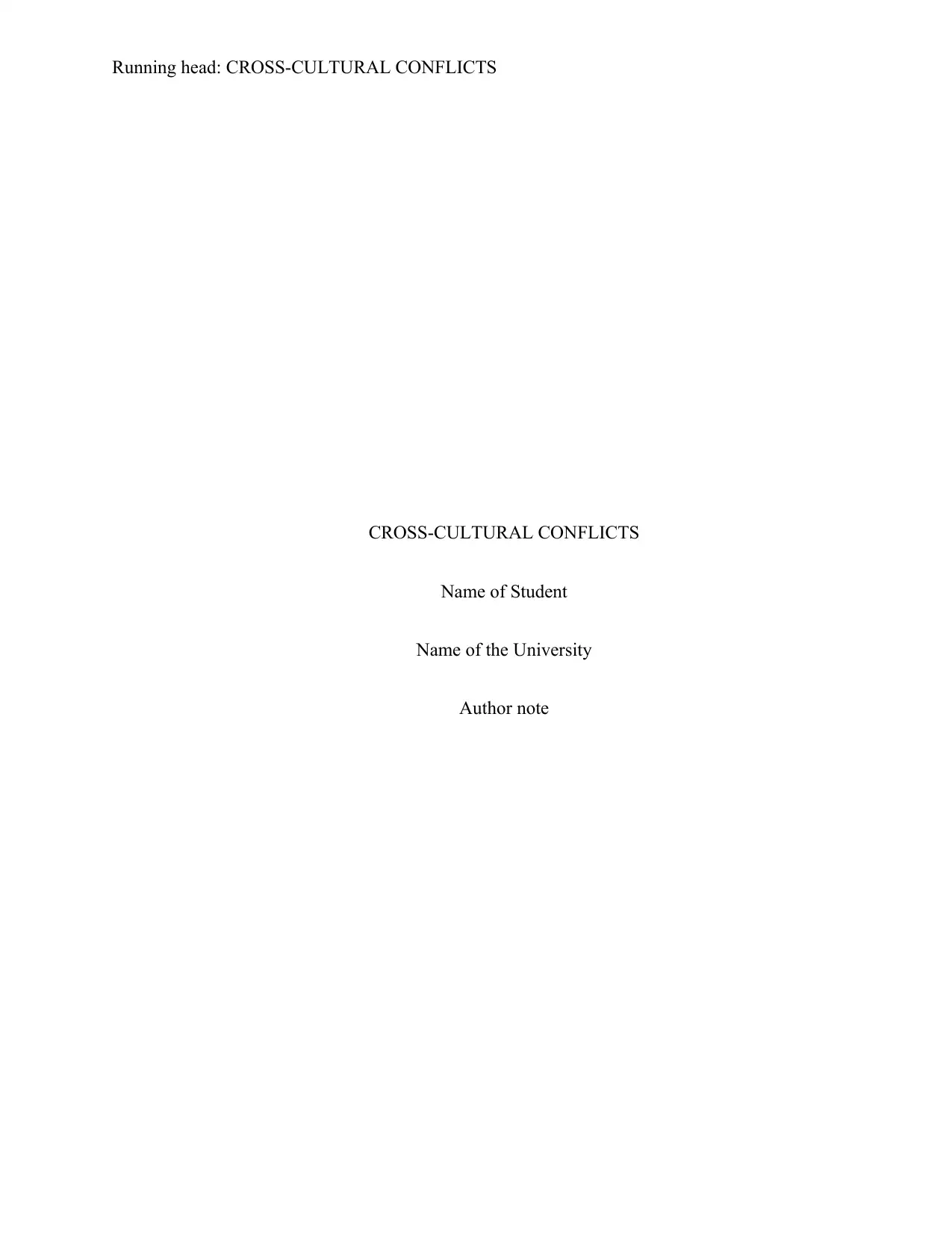
Running head: CROSS-CULTURAL CONFLICTS
CROSS-CULTURAL CONFLICTS
Name of Student
Name of the University
Author note
CROSS-CULTURAL CONFLICTS
Name of Student
Name of the University
Author note
Paraphrase This Document
Need a fresh take? Get an instant paraphrase of this document with our AI Paraphraser
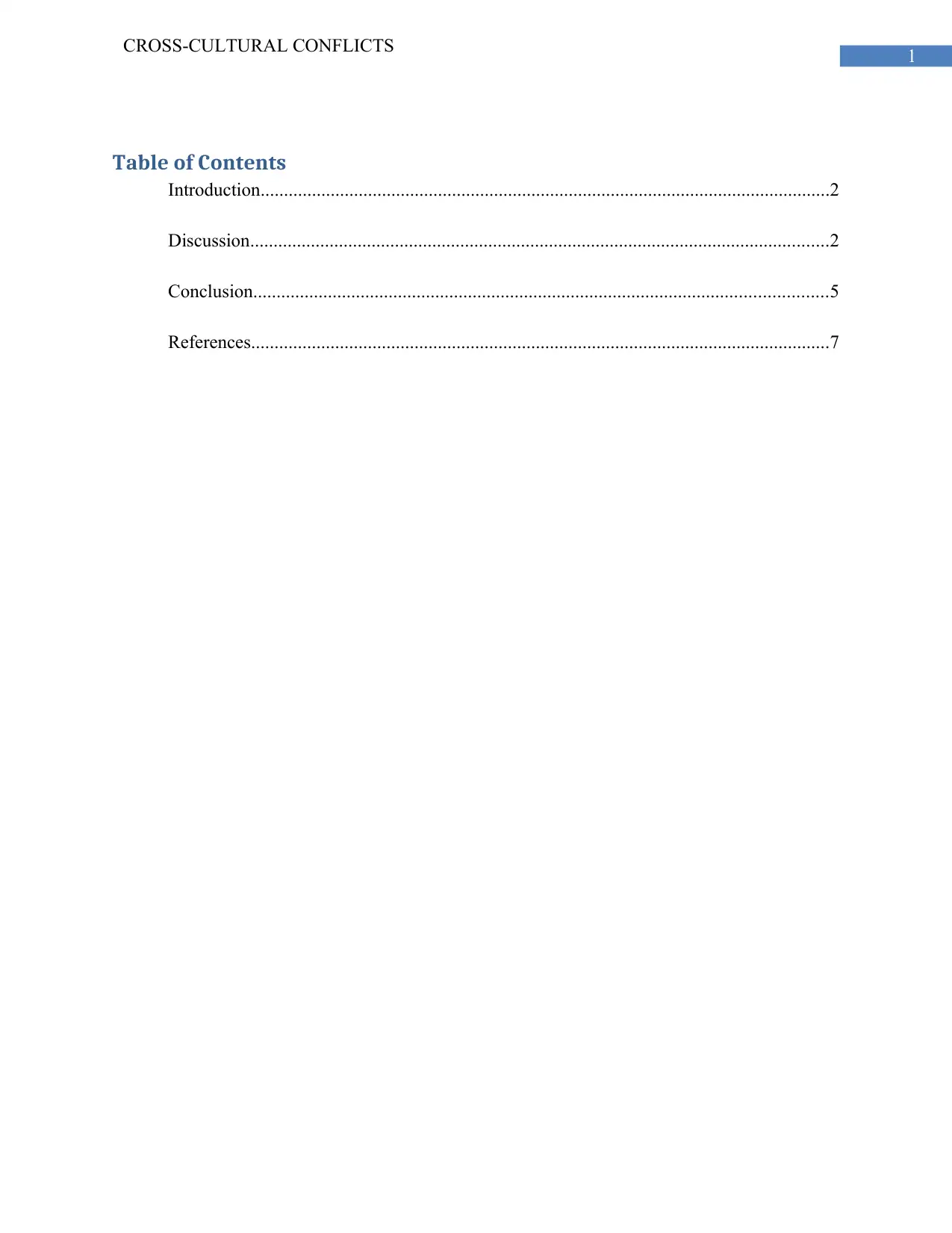
1
CROSS-CULTURAL CONFLICTS
Table of Contents
Introduction..........................................................................................................................2
Discussion............................................................................................................................2
Conclusion...........................................................................................................................5
References............................................................................................................................7
CROSS-CULTURAL CONFLICTS
Table of Contents
Introduction..........................................................................................................................2
Discussion............................................................................................................................2
Conclusion...........................................................................................................................5
References............................................................................................................................7
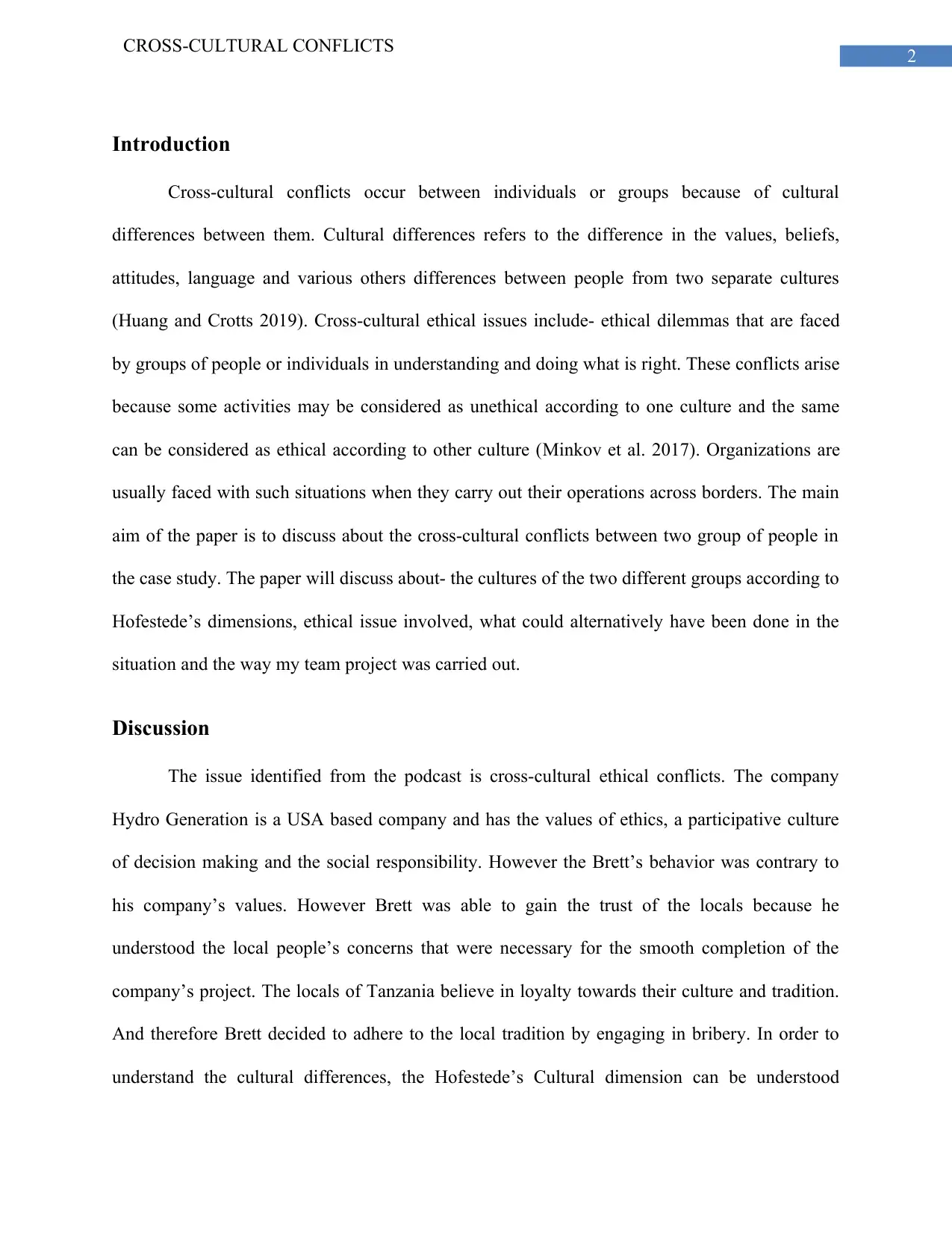
2
CROSS-CULTURAL CONFLICTS
Introduction
Cross-cultural conflicts occur between individuals or groups because of cultural
differences between them. Cultural differences refers to the difference in the values, beliefs,
attitudes, language and various others differences between people from two separate cultures
(Huang and Crotts 2019). Cross-cultural ethical issues include- ethical dilemmas that are faced
by groups of people or individuals in understanding and doing what is right. These conflicts arise
because some activities may be considered as unethical according to one culture and the same
can be considered as ethical according to other culture (Minkov et al. 2017). Organizations are
usually faced with such situations when they carry out their operations across borders. The main
aim of the paper is to discuss about the cross-cultural conflicts between two group of people in
the case study. The paper will discuss about- the cultures of the two different groups according to
Hofestede’s dimensions, ethical issue involved, what could alternatively have been done in the
situation and the way my team project was carried out.
Discussion
The issue identified from the podcast is cross-cultural ethical conflicts. The company
Hydro Generation is a USA based company and has the values of ethics, a participative culture
of decision making and the social responsibility. However the Brett’s behavior was contrary to
his company’s values. However Brett was able to gain the trust of the locals because he
understood the local people’s concerns that were necessary for the smooth completion of the
company’s project. The locals of Tanzania believe in loyalty towards their culture and tradition.
And therefore Brett decided to adhere to the local tradition by engaging in bribery. In order to
understand the cultural differences, the Hofestede’s Cultural dimension can be understood
CROSS-CULTURAL CONFLICTS
Introduction
Cross-cultural conflicts occur between individuals or groups because of cultural
differences between them. Cultural differences refers to the difference in the values, beliefs,
attitudes, language and various others differences between people from two separate cultures
(Huang and Crotts 2019). Cross-cultural ethical issues include- ethical dilemmas that are faced
by groups of people or individuals in understanding and doing what is right. These conflicts arise
because some activities may be considered as unethical according to one culture and the same
can be considered as ethical according to other culture (Minkov et al. 2017). Organizations are
usually faced with such situations when they carry out their operations across borders. The main
aim of the paper is to discuss about the cross-cultural conflicts between two group of people in
the case study. The paper will discuss about- the cultures of the two different groups according to
Hofestede’s dimensions, ethical issue involved, what could alternatively have been done in the
situation and the way my team project was carried out.
Discussion
The issue identified from the podcast is cross-cultural ethical conflicts. The company
Hydro Generation is a USA based company and has the values of ethics, a participative culture
of decision making and the social responsibility. However the Brett’s behavior was contrary to
his company’s values. However Brett was able to gain the trust of the locals because he
understood the local people’s concerns that were necessary for the smooth completion of the
company’s project. The locals of Tanzania believe in loyalty towards their culture and tradition.
And therefore Brett decided to adhere to the local tradition by engaging in bribery. In order to
understand the cultural differences, the Hofestede’s Cultural dimension can be understood
⊘ This is a preview!⊘
Do you want full access?
Subscribe today to unlock all pages.

Trusted by 1+ million students worldwide
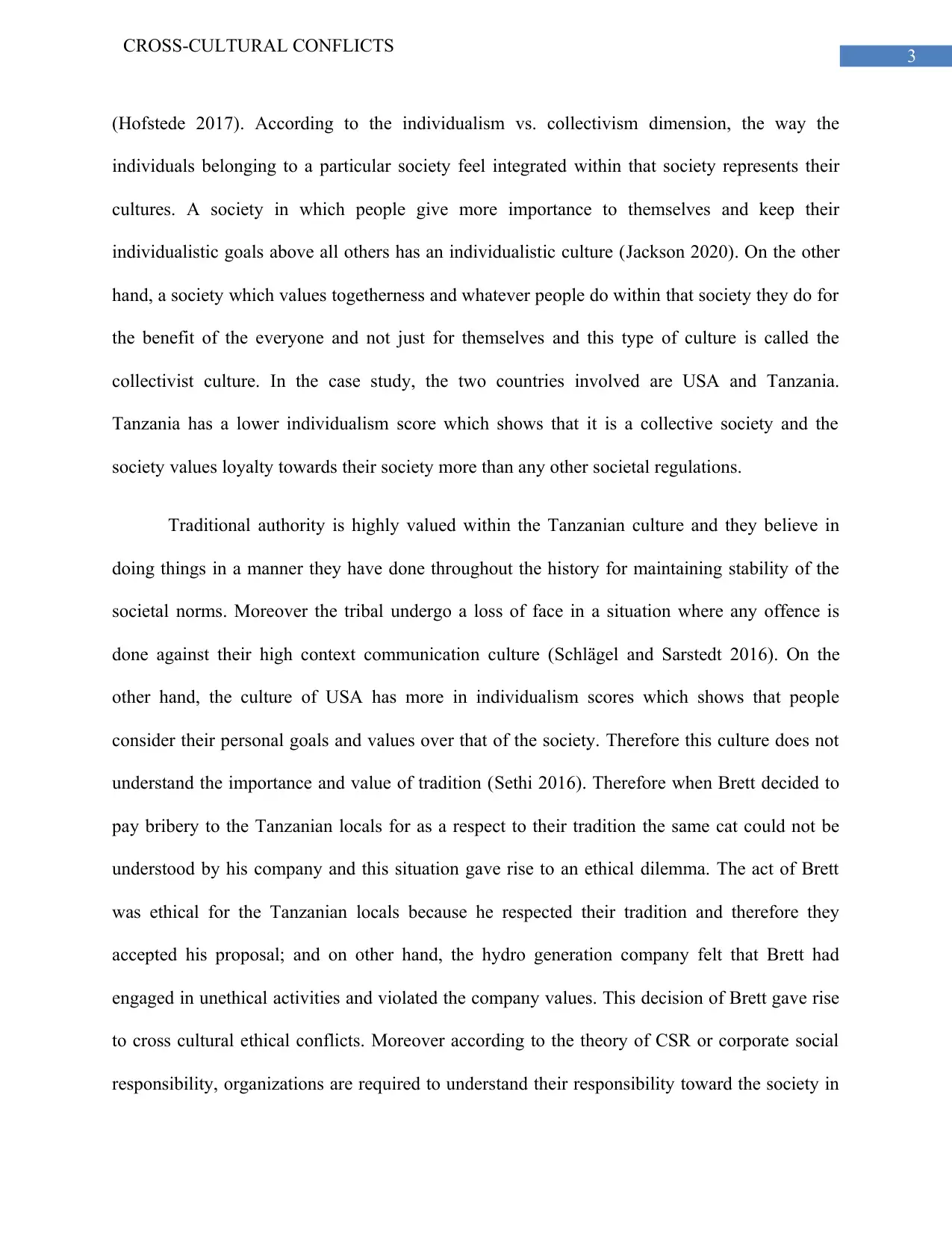
3
CROSS-CULTURAL CONFLICTS
(Hofstede 2017). According to the individualism vs. collectivism dimension, the way the
individuals belonging to a particular society feel integrated within that society represents their
cultures. A society in which people give more importance to themselves and keep their
individualistic goals above all others has an individualistic culture (Jackson 2020). On the other
hand, a society which values togetherness and whatever people do within that society they do for
the benefit of the everyone and not just for themselves and this type of culture is called the
collectivist culture. In the case study, the two countries involved are USA and Tanzania.
Tanzania has a lower individualism score which shows that it is a collective society and the
society values loyalty towards their society more than any other societal regulations.
Traditional authority is highly valued within the Tanzanian culture and they believe in
doing things in a manner they have done throughout the history for maintaining stability of the
societal norms. Moreover the tribal undergo a loss of face in a situation where any offence is
done against their high context communication culture (Schlägel and Sarstedt 2016). On the
other hand, the culture of USA has more in individualism scores which shows that people
consider their personal goals and values over that of the society. Therefore this culture does not
understand the importance and value of tradition (Sethi 2016). Therefore when Brett decided to
pay bribery to the Tanzanian locals for as a respect to their tradition the same cat could not be
understood by his company and this situation gave rise to an ethical dilemma. The act of Brett
was ethical for the Tanzanian locals because he respected their tradition and therefore they
accepted his proposal; and on other hand, the hydro generation company felt that Brett had
engaged in unethical activities and violated the company values. This decision of Brett gave rise
to cross cultural ethical conflicts. Moreover according to the theory of CSR or corporate social
responsibility, organizations are required to understand their responsibility toward the society in
CROSS-CULTURAL CONFLICTS
(Hofstede 2017). According to the individualism vs. collectivism dimension, the way the
individuals belonging to a particular society feel integrated within that society represents their
cultures. A society in which people give more importance to themselves and keep their
individualistic goals above all others has an individualistic culture (Jackson 2020). On the other
hand, a society which values togetherness and whatever people do within that society they do for
the benefit of the everyone and not just for themselves and this type of culture is called the
collectivist culture. In the case study, the two countries involved are USA and Tanzania.
Tanzania has a lower individualism score which shows that it is a collective society and the
society values loyalty towards their society more than any other societal regulations.
Traditional authority is highly valued within the Tanzanian culture and they believe in
doing things in a manner they have done throughout the history for maintaining stability of the
societal norms. Moreover the tribal undergo a loss of face in a situation where any offence is
done against their high context communication culture (Schlägel and Sarstedt 2016). On the
other hand, the culture of USA has more in individualism scores which shows that people
consider their personal goals and values over that of the society. Therefore this culture does not
understand the importance and value of tradition (Sethi 2016). Therefore when Brett decided to
pay bribery to the Tanzanian locals for as a respect to their tradition the same cat could not be
understood by his company and this situation gave rise to an ethical dilemma. The act of Brett
was ethical for the Tanzanian locals because he respected their tradition and therefore they
accepted his proposal; and on other hand, the hydro generation company felt that Brett had
engaged in unethical activities and violated the company values. This decision of Brett gave rise
to cross cultural ethical conflicts. Moreover according to the theory of CSR or corporate social
responsibility, organizations are required to understand their responsibility toward the society in
Paraphrase This Document
Need a fresh take? Get an instant paraphrase of this document with our AI Paraphraser
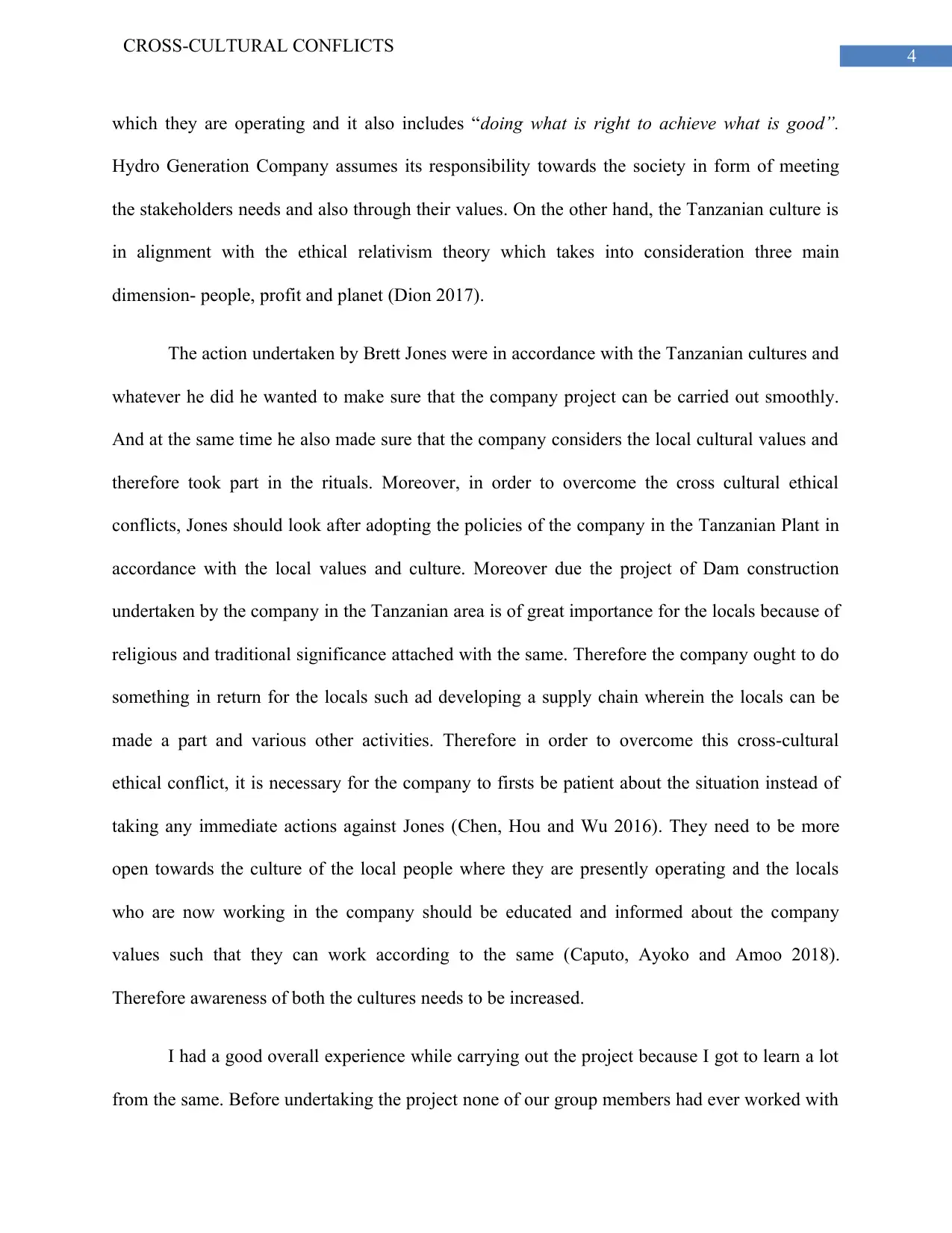
4
CROSS-CULTURAL CONFLICTS
which they are operating and it also includes “doing what is right to achieve what is good”.
Hydro Generation Company assumes its responsibility towards the society in form of meeting
the stakeholders needs and also through their values. On the other hand, the Tanzanian culture is
in alignment with the ethical relativism theory which takes into consideration three main
dimension- people, profit and planet (Dion 2017).
The action undertaken by Brett Jones were in accordance with the Tanzanian cultures and
whatever he did he wanted to make sure that the company project can be carried out smoothly.
And at the same time he also made sure that the company considers the local cultural values and
therefore took part in the rituals. Moreover, in order to overcome the cross cultural ethical
conflicts, Jones should look after adopting the policies of the company in the Tanzanian Plant in
accordance with the local values and culture. Moreover due the project of Dam construction
undertaken by the company in the Tanzanian area is of great importance for the locals because of
religious and traditional significance attached with the same. Therefore the company ought to do
something in return for the locals such ad developing a supply chain wherein the locals can be
made a part and various other activities. Therefore in order to overcome this cross-cultural
ethical conflict, it is necessary for the company to firsts be patient about the situation instead of
taking any immediate actions against Jones (Chen, Hou and Wu 2016). They need to be more
open towards the culture of the local people where they are presently operating and the locals
who are now working in the company should be educated and informed about the company
values such that they can work according to the same (Caputo, Ayoko and Amoo 2018).
Therefore awareness of both the cultures needs to be increased.
I had a good overall experience while carrying out the project because I got to learn a lot
from the same. Before undertaking the project none of our group members had ever worked with
CROSS-CULTURAL CONFLICTS
which they are operating and it also includes “doing what is right to achieve what is good”.
Hydro Generation Company assumes its responsibility towards the society in form of meeting
the stakeholders needs and also through their values. On the other hand, the Tanzanian culture is
in alignment with the ethical relativism theory which takes into consideration three main
dimension- people, profit and planet (Dion 2017).
The action undertaken by Brett Jones were in accordance with the Tanzanian cultures and
whatever he did he wanted to make sure that the company project can be carried out smoothly.
And at the same time he also made sure that the company considers the local cultural values and
therefore took part in the rituals. Moreover, in order to overcome the cross cultural ethical
conflicts, Jones should look after adopting the policies of the company in the Tanzanian Plant in
accordance with the local values and culture. Moreover due the project of Dam construction
undertaken by the company in the Tanzanian area is of great importance for the locals because of
religious and traditional significance attached with the same. Therefore the company ought to do
something in return for the locals such ad developing a supply chain wherein the locals can be
made a part and various other activities. Therefore in order to overcome this cross-cultural
ethical conflict, it is necessary for the company to firsts be patient about the situation instead of
taking any immediate actions against Jones (Chen, Hou and Wu 2016). They need to be more
open towards the culture of the local people where they are presently operating and the locals
who are now working in the company should be educated and informed about the company
values such that they can work according to the same (Caputo, Ayoko and Amoo 2018).
Therefore awareness of both the cultures needs to be increased.
I had a good overall experience while carrying out the project because I got to learn a lot
from the same. Before undertaking the project none of our group members had ever worked with
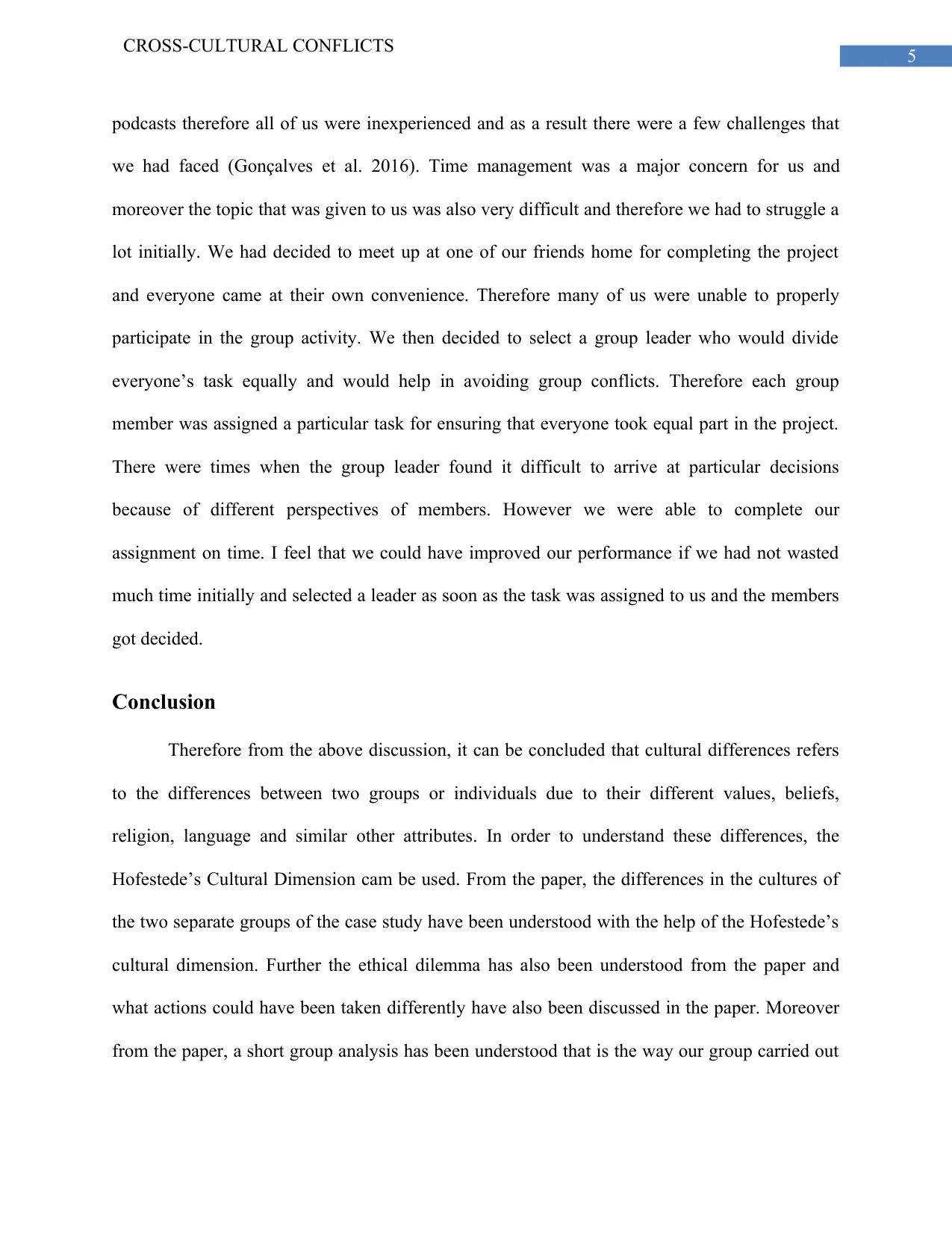
5
CROSS-CULTURAL CONFLICTS
podcasts therefore all of us were inexperienced and as a result there were a few challenges that
we had faced (Gonçalves et al. 2016). Time management was a major concern for us and
moreover the topic that was given to us was also very difficult and therefore we had to struggle a
lot initially. We had decided to meet up at one of our friends home for completing the project
and everyone came at their own convenience. Therefore many of us were unable to properly
participate in the group activity. We then decided to select a group leader who would divide
everyone’s task equally and would help in avoiding group conflicts. Therefore each group
member was assigned a particular task for ensuring that everyone took equal part in the project.
There were times when the group leader found it difficult to arrive at particular decisions
because of different perspectives of members. However we were able to complete our
assignment on time. I feel that we could have improved our performance if we had not wasted
much time initially and selected a leader as soon as the task was assigned to us and the members
got decided.
Conclusion
Therefore from the above discussion, it can be concluded that cultural differences refers
to the differences between two groups or individuals due to their different values, beliefs,
religion, language and similar other attributes. In order to understand these differences, the
Hofestede’s Cultural Dimension cam be used. From the paper, the differences in the cultures of
the two separate groups of the case study have been understood with the help of the Hofestede’s
cultural dimension. Further the ethical dilemma has also been understood from the paper and
what actions could have been taken differently have also been discussed in the paper. Moreover
from the paper, a short group analysis has been understood that is the way our group carried out
CROSS-CULTURAL CONFLICTS
podcasts therefore all of us were inexperienced and as a result there were a few challenges that
we had faced (Gonçalves et al. 2016). Time management was a major concern for us and
moreover the topic that was given to us was also very difficult and therefore we had to struggle a
lot initially. We had decided to meet up at one of our friends home for completing the project
and everyone came at their own convenience. Therefore many of us were unable to properly
participate in the group activity. We then decided to select a group leader who would divide
everyone’s task equally and would help in avoiding group conflicts. Therefore each group
member was assigned a particular task for ensuring that everyone took equal part in the project.
There were times when the group leader found it difficult to arrive at particular decisions
because of different perspectives of members. However we were able to complete our
assignment on time. I feel that we could have improved our performance if we had not wasted
much time initially and selected a leader as soon as the task was assigned to us and the members
got decided.
Conclusion
Therefore from the above discussion, it can be concluded that cultural differences refers
to the differences between two groups or individuals due to their different values, beliefs,
religion, language and similar other attributes. In order to understand these differences, the
Hofestede’s Cultural Dimension cam be used. From the paper, the differences in the cultures of
the two separate groups of the case study have been understood with the help of the Hofestede’s
cultural dimension. Further the ethical dilemma has also been understood from the paper and
what actions could have been taken differently have also been discussed in the paper. Moreover
from the paper, a short group analysis has been understood that is the way our group carried out
⊘ This is a preview!⊘
Do you want full access?
Subscribe today to unlock all pages.

Trusted by 1+ million students worldwide
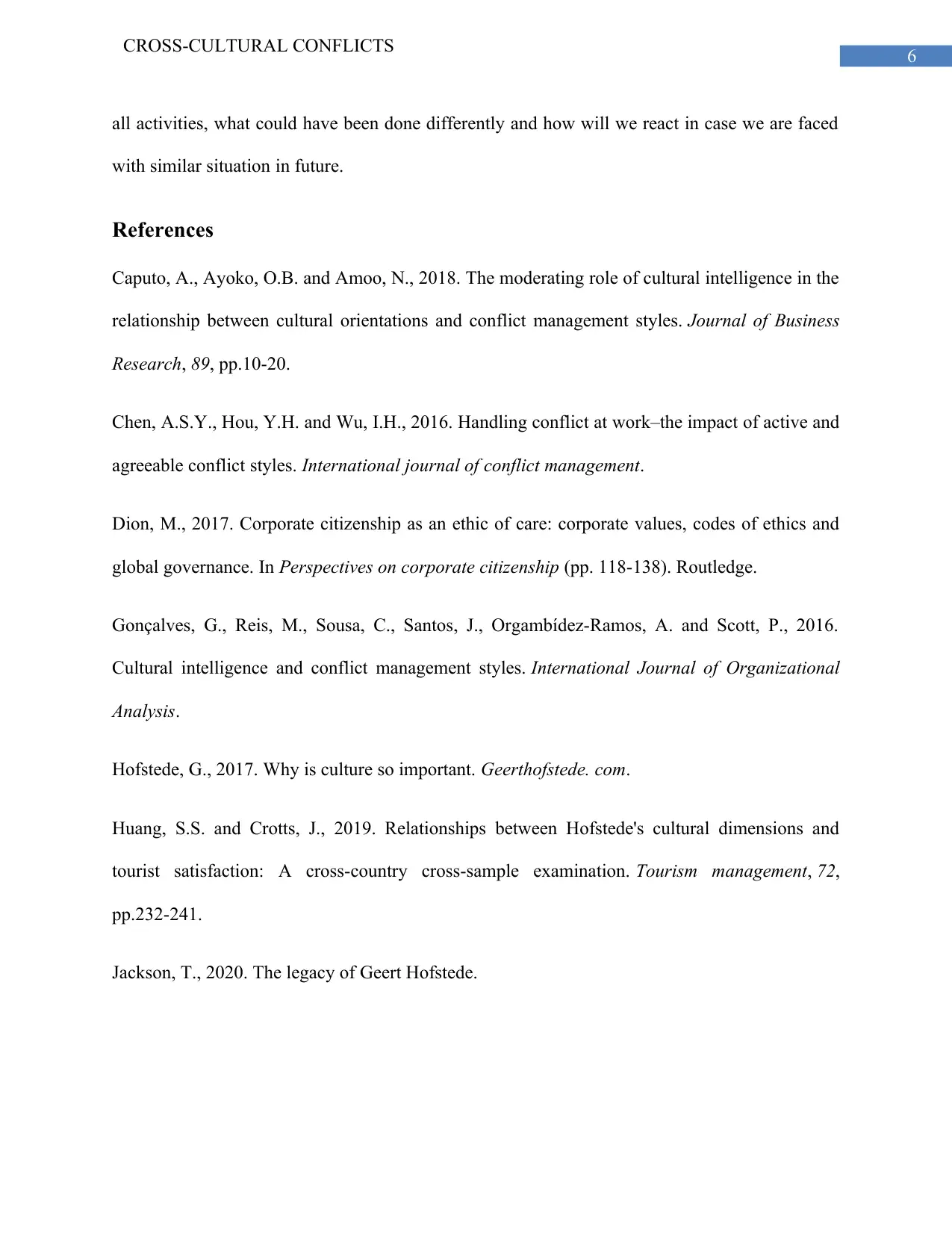
6
CROSS-CULTURAL CONFLICTS
all activities, what could have been done differently and how will we react in case we are faced
with similar situation in future.
References
Caputo, A., Ayoko, O.B. and Amoo, N., 2018. The moderating role of cultural intelligence in the
relationship between cultural orientations and conflict management styles. Journal of Business
Research, 89, pp.10-20.
Chen, A.S.Y., Hou, Y.H. and Wu, I.H., 2016. Handling conflict at work–the impact of active and
agreeable conflict styles. International journal of conflict management.
Dion, M., 2017. Corporate citizenship as an ethic of care: corporate values, codes of ethics and
global governance. In Perspectives on corporate citizenship (pp. 118-138). Routledge.
Gonçalves, G., Reis, M., Sousa, C., Santos, J., Orgambídez-Ramos, A. and Scott, P., 2016.
Cultural intelligence and conflict management styles. International Journal of Organizational
Analysis.
Hofstede, G., 2017. Why is culture so important. Geerthofstede. com.
Huang, S.S. and Crotts, J., 2019. Relationships between Hofstede's cultural dimensions and
tourist satisfaction: A cross-country cross-sample examination. Tourism management, 72,
pp.232-241.
Jackson, T., 2020. The legacy of Geert Hofstede.
CROSS-CULTURAL CONFLICTS
all activities, what could have been done differently and how will we react in case we are faced
with similar situation in future.
References
Caputo, A., Ayoko, O.B. and Amoo, N., 2018. The moderating role of cultural intelligence in the
relationship between cultural orientations and conflict management styles. Journal of Business
Research, 89, pp.10-20.
Chen, A.S.Y., Hou, Y.H. and Wu, I.H., 2016. Handling conflict at work–the impact of active and
agreeable conflict styles. International journal of conflict management.
Dion, M., 2017. Corporate citizenship as an ethic of care: corporate values, codes of ethics and
global governance. In Perspectives on corporate citizenship (pp. 118-138). Routledge.
Gonçalves, G., Reis, M., Sousa, C., Santos, J., Orgambídez-Ramos, A. and Scott, P., 2016.
Cultural intelligence and conflict management styles. International Journal of Organizational
Analysis.
Hofstede, G., 2017. Why is culture so important. Geerthofstede. com.
Huang, S.S. and Crotts, J., 2019. Relationships between Hofstede's cultural dimensions and
tourist satisfaction: A cross-country cross-sample examination. Tourism management, 72,
pp.232-241.
Jackson, T., 2020. The legacy of Geert Hofstede.
Paraphrase This Document
Need a fresh take? Get an instant paraphrase of this document with our AI Paraphraser
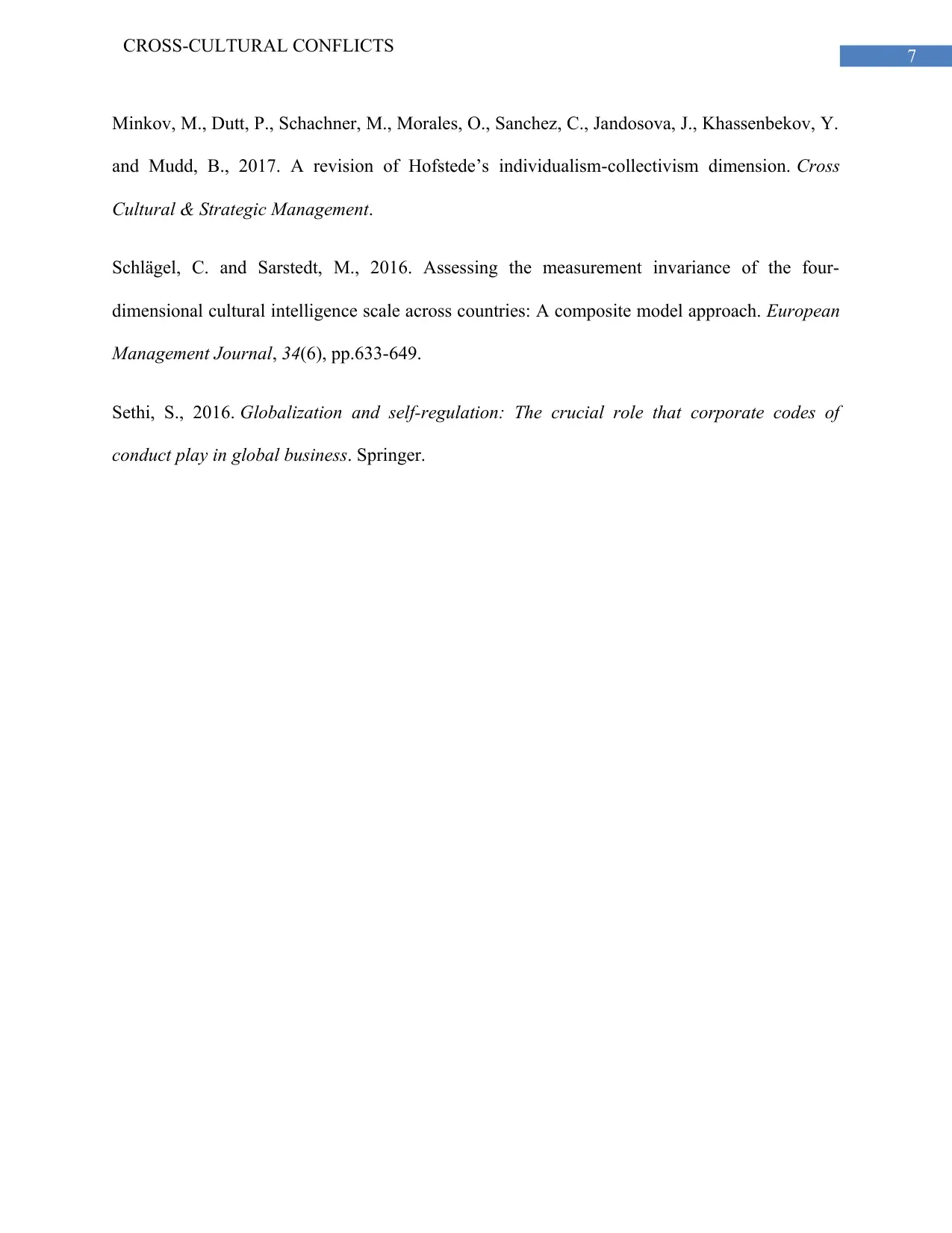
7
CROSS-CULTURAL CONFLICTS
Minkov, M., Dutt, P., Schachner, M., Morales, O., Sanchez, C., Jandosova, J., Khassenbekov, Y.
and Mudd, B., 2017. A revision of Hofstede’s individualism-collectivism dimension. Cross
Cultural & Strategic Management.
Schlägel, C. and Sarstedt, M., 2016. Assessing the measurement invariance of the four-
dimensional cultural intelligence scale across countries: A composite model approach. European
Management Journal, 34(6), pp.633-649.
Sethi, S., 2016. Globalization and self-regulation: The crucial role that corporate codes of
conduct play in global business. Springer.
CROSS-CULTURAL CONFLICTS
Minkov, M., Dutt, P., Schachner, M., Morales, O., Sanchez, C., Jandosova, J., Khassenbekov, Y.
and Mudd, B., 2017. A revision of Hofstede’s individualism-collectivism dimension. Cross
Cultural & Strategic Management.
Schlägel, C. and Sarstedt, M., 2016. Assessing the measurement invariance of the four-
dimensional cultural intelligence scale across countries: A composite model approach. European
Management Journal, 34(6), pp.633-649.
Sethi, S., 2016. Globalization and self-regulation: The crucial role that corporate codes of
conduct play in global business. Springer.
1 out of 8
Related Documents
Your All-in-One AI-Powered Toolkit for Academic Success.
+13062052269
info@desklib.com
Available 24*7 on WhatsApp / Email
![[object Object]](/_next/static/media/star-bottom.7253800d.svg)
Unlock your academic potential
Copyright © 2020–2026 A2Z Services. All Rights Reserved. Developed and managed by ZUCOL.





